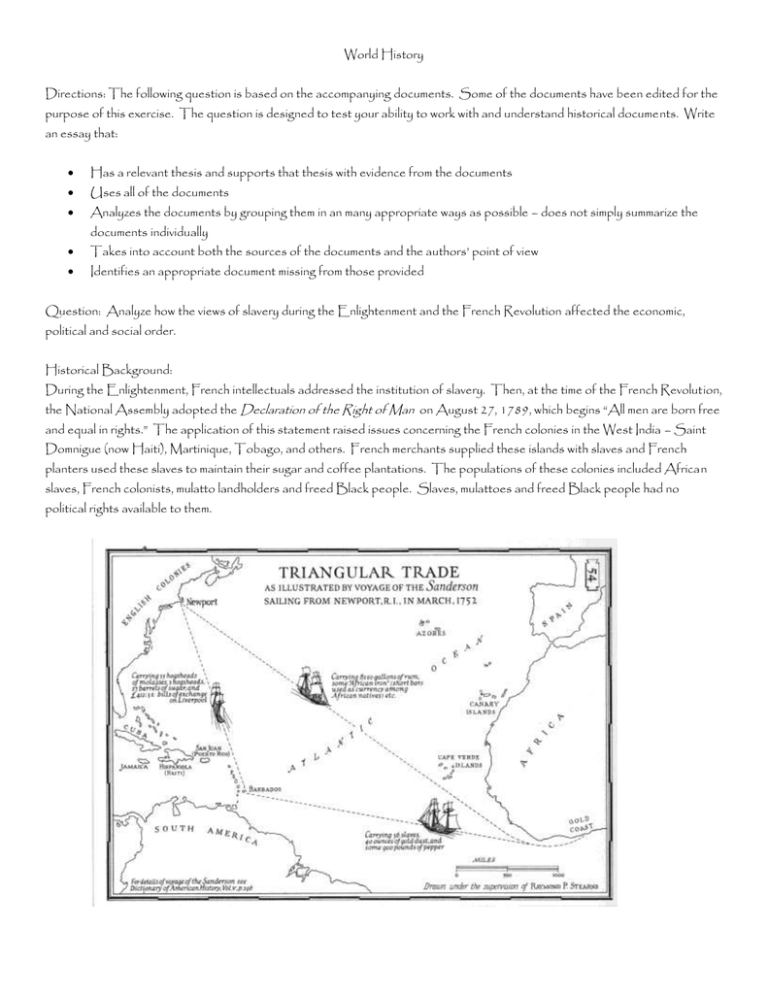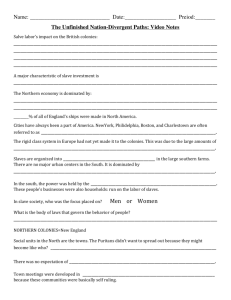World History
advertisement

World History Directions: The following question is based on the accompanying documents. Some of the documents have been edited for the purpose of this exercise. The question is designed to test your ability to work with and understand historical documents. Write an essay that: Has a relevant thesis and supports that thesis with evidence from the documents Uses all of the documents Analyzes the documents by grouping them in an many appropriate ways as possible – does not simply summarize the documents individually Takes into account both the sources of the documents and the authors’ point of view Identifies an appropriate document missing from those provided Question: Analyze how the views of slavery during the Enlightenment and the French Revolution affected the economic, political and social order. Historical Background: During the Enlightenment, French intellectuals addressed the institution of slavery. Then, at the time of the French Revolution, the National Assembly adopted the Declaration of the Right of Man on August 27, 1789, which begins “All men are born free and equal in rights.” The application of this statement raised issues concerning the French colonies in the West India – Saint Domnigue (now Haiti), Martinique, Tobago, and others. French merchants supplied these islands with slaves and French planters used these slaves to maintain their sugar and coffee plantations. The populations of these colonies included African slaves, French colonists, mulatto landholders and freed Black people. Slaves, mulattoes and freed Black people had no political rights available to them. Document 1 Louis de Jaucourt, “The Slave”, contribution made to Diderot’s Encyclopedia, 1755. Everything concurs to let humans enjoy dignity, which is natural. Everything tells us that we cannot take away from a person that natural dignity which is Liberty. Masters who acquired new slaves were obligated by law to have them instructed in the Catholic faith. This motivated Louis XIII to authorize this horrid commerce in human flesh. Document 2 Voltaire, Essay on Morals and Customs, 1756. One hundred thousand slaves, Black or mulatto, work in sugar mills, indigo and cocoa plantations, sacrificing their lives to gratify our newly acquired appetites for sugar, cocoa, coffee, and tobacco – things unknown to our ancestors. Document 3 Denis Diderot, “Natural Liberty”, contribution to the Encyclopedia, 1765. Why did the Christian powers not consider that their religion, independent of natural law, was fundamentally opposed to Black slavery? The answer is that those nations needed slaves for their colonies, their plantations, and their mines. Document 4 Guillaume Raynal, Essay on the Administration of Saint Domingue, 1781. White people are incapable of working the field under the hot sun in St. Domingue; thus to make the best of this precious soil, it has been necessary to find a particular laborer. St. Dominigue is a milder climate for the slaves than the hot climate from which they have been transplanted. Document 5 Olympe de Gouges, Reflections, 1788. Why are the Black people enslaved? The color of people’s skin only suggests a slight difference. There is no discord between day and night, the sun and the moon and between the stars and the dark sky. All is varied; it is the beauty of nature. Why destroy nature’s work? Document 6 Jacques Necker, speech, opening meeting of the French Estates General, May 1789. A day may come, gentlemen, when you will cast a glance of compassion on these unfortunate people who have been made a barbaric object of trade; these people who are similar to us, in thought, and above all, in their capacity to suffer.” Document 7 Count Mirabeau, speech, National Assembly, July 3, 1789. I demand to know how the twenty White people here from the colonies can be said to represent the people of color from whom they have received no authority. I demand to know by what right 23,000 White voters have refused their fellow citizens the right to name representatives and have arrogated to themselves the right to choose representatives for those who have been excluded. Document 8 A delegate from Bordeaux, France, speech, National Assembly, March 2, 1790. The abolition of slavery and the slave trade would mean the loss of our colonies; the loss of the colonies would strike a mortal blow to commerce, and the ruin of commerce would result in the stagnation for the merchant marine, agriculture, and the arts. Five million French citizens exist only by the trade they bring. The colonies bring in an annual income of more than 200 million livres. Document 9 A delegate of the Owners of Property in the French Colonies of America Residing in Bordeaux , speech, National Assembly, date unknown. End our fears by declaring that your proclamation on the Rights of Man does not extend to the Black people and their descendants. We have not enslaved them, but he discovered them in the hardest and cruelest slavery, and transplanted them to French colonies, under a kind humane government, where, indeed they work, but they live without fear for tomorrow. Document 10 Antonie Barnave, report, National Assembly’s Committee on the Colonies, 1790. We have reached this level of prosperity thanks to our colonies. If someday they must gain independence, we must make sure to postpone that day so that we will be able to lose them without an economic shock and without a disturbance to our political existence. Document 11 Maximilien Robespierre, speech, National Assembly, May 15, 1791. I am here to defend the Declaration of the Rights of Man. Let the colonies perish if the planters, with their threats, try to force us to legislate in their private interest! I declare in the name of the Assembly, in the name of the members of the Assembly who do want to destroy the Constitution, I declare in the name of the entire nation which wishes to be free, what we will not sacrifice to the colonial deputies. I say that any other course, whatever it might be, is preferable. Document 12 Decree of the National Convention, February 4, 1794 The National Convention declares the abolition of Negro slavery in all the colonies; in consequence it decrees that all men, without distinction of color, residing in the colonies, are French citizens and will enjoy the rights assured by the Constitution. Document 13 Vincent Ogé, Saint Domingue mulatto property owner, petition to the Assembly of Colonists, 1789. But Sirs…This Freedom, the greatest, the first of goods, is it made for all men? I believe so. Should it be given to all men? I believe so again. But how should it be rendered? What should be the timing and the conditions? Here is for us, Sirs, the greatest, the most important of all questions; it interests America, Africa, France, all Europe and it is principally this question that has determined me, Sirs, to ask you to hear me out. If we do not take the most prompt and efficacious measures; if firmness, courage, and constancy do not animate all of us; if we do not quickly bring together all our intelligence, all our means, and all our efforts; if we fall asleep for an instant on the edge of the abyss, we will tremble upon awakening! We will see blood flowing, our lands invaded, the objects of our industry ravaged, our homes burnt. We will see our neighbors, our friends, our wives, our children with their throats cut and their bodies mutilated; the slave will raise the standard of revolt, and the islands [of the Caribbean] will be but a vast and baleful conflagration; commerce will be ruined, France will receive a mortal wound, and a multitude of honest citizens will be impoverished and ruined; we will lose everything.





